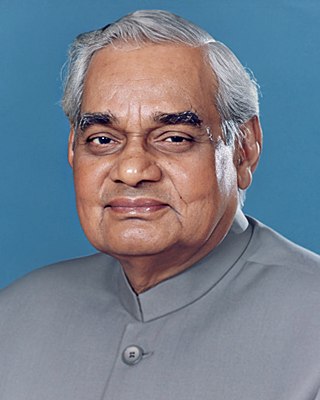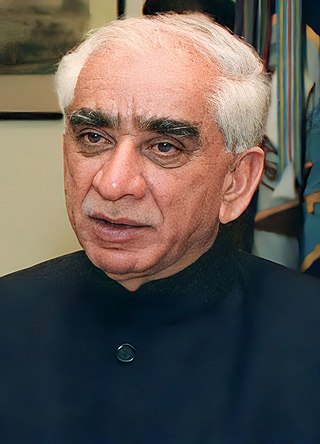Related Research Articles

The prime minister of India is the head of Union Council of Ministersof the Republic of India. Executive authority is vested in the prime minister and his chosen Council of Ministers, despite the president of India being the nominal head of the executive. The prime minister has to be a (nominated) member of one of the houses of bicameral Parliament of India, alongside heading the respective house. The prime minister and his cabinet are at all times responsible to the Lok Sabha.

Atal Bihari Vajpayee was an Indian politician, statesman and poet who served as the prime minister of India, first for a term of 13 days in 1996, then for a period of 13 months from 1998 to 1999, followed by a full term from 1999 to 2004. He was the first non-Congress prime minister to serve a full term in the office. Vajpayee was one of the co-founders and a senior leader of the Bharatiya Janata Party. He was a member of the RSS, a Hindu nationalist volunteer organisation. He was also a Hindi poet and a writer.

The Rajya Sabha, also known as the Council of States, is the upper house of the bicameral Parliament of India. As of 2023, it has a maximum membership of 245, of which 233 are elected by the legislatures of the states and union territories using single transferable votes through open ballots, while the president can appoint 12 members for their contributions to art, literature, science, and social service. The total allowed capacity is 250 according to article 80 of the Indian Constitution. The current potential seating capacity of the Rajya Sabha is 245, after the Jammu and Kashmir (Reorganisation) Act. The maximum seats of 250 members can be filled up at the discretion and requirements of the house of Rajya Sabha.

The Lok Sabha, also known as the House of the People, is the lower house of India's bicameral Parliament, with the upper house being the Rajya Sabha. Members of the Lok Sabha are elected by an adult universal suffrage and a first-past-the-post system to represent their respective constituencies, and they hold their seats for five years or until the body is dissolved by the president on the advice of the council of ministers. The house meets in the Lok Sabha Chambers of the Parliament House, New Delhi.

The Parliament of India or Indian Parliament, is the supreme legislative body of the Republic of India. It is a bicameral legislature composed of the Rajya Sabha and the Lok Sabha. The president of the Republic of India, in their role as head of the legislature, has full powers to summon and prorogue either house of Parliament or to dissolve the Lok Sabha, but they can exercise these powers only upon the advice of the prime minister and the Union Council of Ministers.

Major Jaswant Singh was an officer of the Indian Army and an Indian Cabinet Minister. He was one of the founding members of the Bharatiya Janata Party (BJP), and was one of India's longest serving parliamentarians, having been a member of the Lok Sabha or the Rajya Sabha almost continuously between 1980 and 2014. He was NDA's Vice-presidential candidate in the 2012 Indian vice-presidential election. Singh was the only leader from Rajasthan who had the distinction of becoming the Minister Of External Affairs, Finance and Defence.

The 14th Lok Sabha was convened after the 2004 Indian general election held in four phases during 20 April – 10 May 2004, which led to the formation of first Manmohan Singh ministry (2004–2009). Indian National Congress-led United Progressive Alliance won 62 more seats than previous 13th Lok Sabha. The Lok Sabha is the lower house in the Parliament of India. 8 sitting members from Rajya Sabha, the Upper House of Indian Parliament, were elected to 14th Lok Sabha after the 2004 Indian general election.

Mukhtar Abbas Naqvi is an Indian politician and was the Union Minister of Minority Affairs. He had served as a Member of Parliament in the Rajya Sabha from 2002 to 2022 and was Deputy Leader of the House in Rajya Sabha between 2021 and 2022.
K. Jana Krishnamurthi was an Indian political leader who rose to be the President of the Bharatiya Janata Party (BJP) in 2001. A former Union Law Minister and a member of the Parliament of India, Krishnamurthi was the second person from Tamil Nadu to head a national party in India after Kamaraj.
A joint session or joint convention is, most broadly, when two normally separate decision-making groups meet, often in a special session or other extraordinary meeting, for a specific purpose.

The 13th Lok Sabha is the thirteenth session of the Lok Sabha. It was convened after 1999 Indian general election held during September–October 1999.

The 12th Lok Sabha, was constituted after the 1998 Indian general election held during February–March 1998. This was the second consecutive Lok Sabha, like the 11th Lok Sabha elections that did not provide the country with a stable government. Atal Bihari Vajpayee became the 10th Prime Minister of India but the government lasted for only about thirteen months due to no clear mandate. Also, the party was not able to get support from other parties, after the withdrawal of support by AIADMK. After his resignation, then President K. R. Narayanan asked Sonia Gandhi, the leader of the opposition in the Lok Sabha to form the government; however, Gandhi responded that the UPA would not be able to form a government at the center, following which President Narayanan dissolved the House. The next General elections of 1999 for 13th Lok Sabha provided India a stable government that lasted for full five years. Nine sitting members from Rajya Sabha, the Upper House of Indian Parliament, were elected to 12th Lok Sabha after the 1998 Indian general election.

The 11th Lok Sabha was constituted after April–May 1996 general elections. The result of the election was a hung parliament, which would see three Prime Ministers in two years and force the country back to the polls in 1998. Atal Bihari Vajpayee of Bharatiya Janata Party, the single largest party to win this election, winning 67 more seats than previous 10th Lok Sabha, formed the government which lasted for only 13 days.

Shyam Nandan Mishra was an Indian independence activist and politician from Bihar. He was Member of Parliament for many years in both the Lok Sabha and Rajya Sabha. Initially a member of the Indian National Congress, he was later Leader of the Opposition in Rajya Sabha as a Congress (O) leader, and then a Janata Party MP and Minister for External Affairs in Charan Singh's government. He was imprisoned both during the Quit India Movement and the Emergency.
The Women's Reservation Bill or The Constitution Bill, 9 March 2010, is a bill passed in the Parliament of India which says to amend the Constitution of India to reserve 1/3 of all seats in the lower house of Parliament of India, the Lok Sabha, and in all state legislative assemblies for women. The seats were proposed to be reserved in rotation and would have been determined by draw of lots in such a way that a seat would be reserved only once in three consecutive general elections.
This is a summary of the electoral history of Atal Bihari Vajpayee, who was Prime Minister of India in 1996 and from 1998 till 2004. He was the leader of Bhartiya Janata Party from 1989 to 2004. He was elected ten times to Lok Sabha, the lower house of the Indian parliament. He also served as a member of Rajya Sabha, the upper house for two terms.

The Leader of the House in Lok Sabha is the prime minister if they are a member of the house. If the prime minister is not a member of the Lok Sabha, a minister who is nominated by the prime minister serves as the leader of the house.

The Leader of the Bharatiya Janata Party in Parliament is the parliamentary chairperson and representative of the National Executive of the Bharatiya Janata in the Parliament of India.
The Constitution Act, popularly known as the Women's Reservation Bill, 2023, was introduced in Lok Sabha on 19 September 2023 during the special session of Parliament. This legislation seeks to allocate 33 percent of the seats in the directly elected Lok Sabha, State legislative assemblies and Delhi legislative assembly for women.
References
- ↑ Roy, Chakshu (23 December 2020). "Explained: A look at how and when Parliament is convened". PRS Legislative Research . Retrieved 15 September 2023.
- 1 2 3 4 5 6 7 8 "Special Session of Parliament: What is so special about it?". ETV Bharat News. 2 September 2023. Retrieved 14 September 2023.
- 1 2 3 "Special Parliament session: As govt says no need to consult parties, here is what the rules say". The Indian Express. 6 September 2023. Retrieved 14 September 2023.
- ↑ "Special Parliament session: As govt says no need to consult parties, here is what the rules say". The Indian Express. 6 September 2023. Retrieved 14 September 2023.
- ↑ "The Constitution of India – in English" (PDF). Retrieved 14 September 2023.
- 1 2 3 4 5 6 7 8 9 10 11 "From 1947 To 2023, Times When Parliament Was Convened For A Special Session". Outlook India. Retrieved 14 September 2023.
- 1 2 3 4 5 6 7 8 Singh, Nandini (13 September 2023). "Special session of Parliament: All about the agenda, history and overview" . Retrieved 15 September 2023.
- ↑ "Call special session of Parliament, allow debates on issues raised by Opposition: Congress to PM Modi". Telegraph India. Retrieved 15 September 2023.
In 1962, then Prime Minister Jawaharlal Nehru had called a special session of Parliament in the midst of war with China on the request of a lone MP, Atal Bihari Vajpayee
- 1 2 3 4 Arora, Ayushi (2 September 2023). "Explained | What is a Special Session of Parliament? How does it work?". Deccan Herald. Retrieved 14 September 2023.
- ↑ "Editorial Note" (PDF). The Journal of Parliamentary Information. XLIII (4): 357. December 1997. Retrieved 14 September 2023.
- ↑ "How the new Parliament building is readying for special session". Firstpost. 12 September 2023. Retrieved 14 September 2023.
- ↑ "India passes law to reserve seats for women legislators". UN Women. 4 October 2023. Retrieved 17 November 2023.
- ↑ "Women's Reservation Bill 2023: The Need To Do More Than Just Pass The Bills". Forbes India. Retrieved 17 November 2023.
- ↑ Ellis-Petersen, Hannah (21 September 2023). "India's lower house votes to reserve a third of seats for women". The Guardian. Retrieved 17 November 2023.